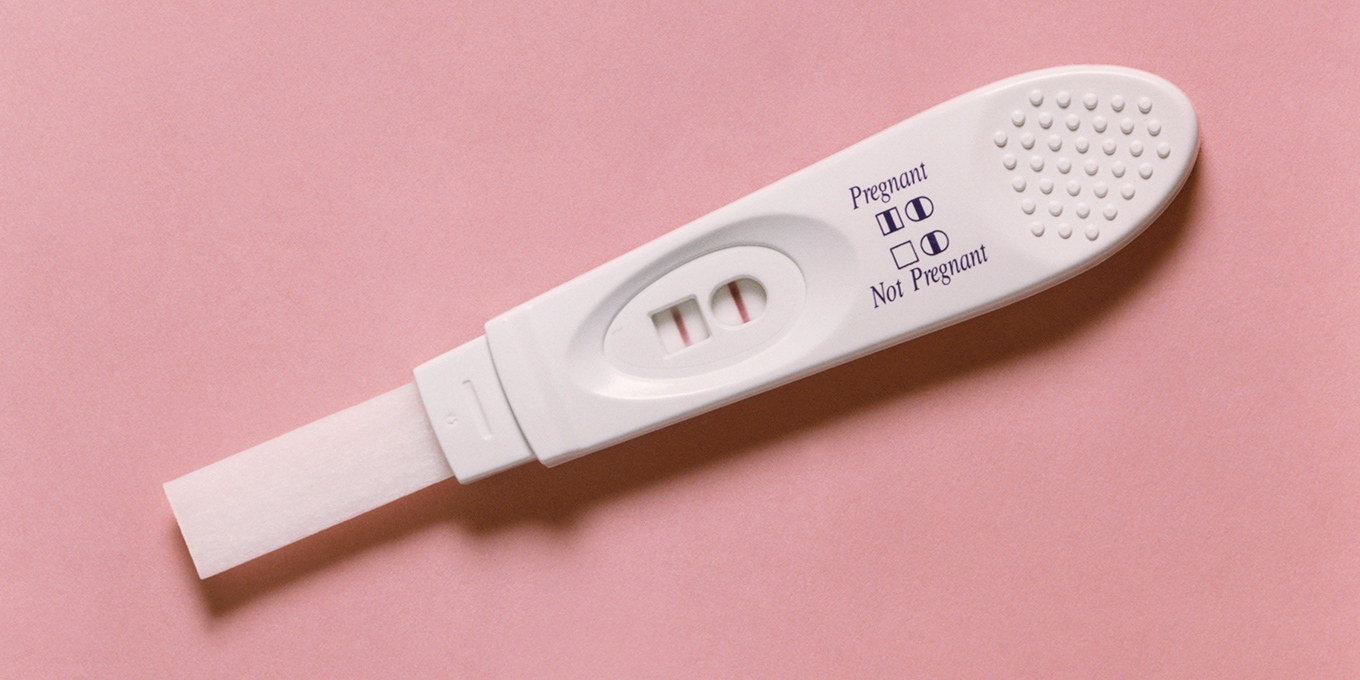Life and Love
Pregnancy in a Pandemic: Here's What You Need to Know
In the best of times, pregnancy is a leap into the unknown. In the midst of a pandemic, it means navigating that without succumbing to the panic that threatens to engulf us all.
by : Amil Niazi- Apr 2nd, 2020

Getty
Two weeks ago, just as Canada started ramping up its efforts to contain and manage the spread of COVID-19, I hit the third trimester of my pregnancy. Until that point, I had been making the same mental preparations for labour and delivery as I had in my first pregnancy, thinking about how we’d get to Toronto’s St. Joseph’s Health Centre, where I had my first child, and daydreaming about the food from the Polish takeout nearby. Other than a particularly paralyzing bout of hyperemesis gravidarum (or severe morning sickness) in the first four months, everything was going relatively smoothly. “All good,” I kept telling friends and family as they checked in with me about the coming baby. At that point, the spread of the virus felt like a concern but one that was manageable and far away; after all, there were no alarm bells relating to pregnant women, Canada’s confirmed cases were still low and the prevailing message was that here it was business as usual.
That feels like a lifetime ago. The word “normal” is suddenly distant and alien. I stopped going into work on Friday, March 13, out of caution and started looking for more information to answer the waves of questions flooding my mind. My GP, who is doing my primary prenatal care, started sending emails about the cancellation of non-urgent appointments. I thought about my situation and wondered what classifies as urgent when you’re responsible for two lives, two heartbeats?
In the best of times, pregnancy is a leap into the unknown, a fumble in the dark where every new kick and every hiccup – or lack thereof – can feel like a mini-crisis. You spend 40 weeks wondering if all of these changes you’re undergoing are normal and if the person you’re growing is okay, and you hold yourself to the fire if anything goes even slightly awry. Pregnancy in the midst of a pandemic means trying to navigate all that without succumbing to the panic that threatens to engulf us all and having to contend with new unknowns that can’t be soothed by a late-night Google or an hour on your preferred mommy message board.
“In the best of times, pregnancy is a leap into the unknown. In the midst of a pandemic, it means navigating that without succumbing to the panic that threatens to engulf us all. ”
My situation is far from unique. There are many expectant Canadian women wondering how the next few months – and longer – will look when it comes to their pregnancy, labour and beyond. As the situation evolves, there are a few things we can glean from early research and past outbreaks.
What does the COVID-19 pandemic mean for pregnancy?
Right now, based on two small clinical trials, there’s no evidence to suggest that in the case of maternal infection there is transmission from the mother to the fetus. “Studies in COVID-infected mothers show that COVID is not present in amniotic fluid, vaginal swabs or breast milk,” Dustin Costescu, associate professor in the department of obstetrics and gynaecology at McMaster University, told me.
There’s also no indication so far that pregnant women are more susceptible to being infected with the virus, although doctors and researchers are closely monitoring infections to see if that changes. “At this time, pregnancy does not appear to be a high-risk condition for COVID when compared to the general population, but, with more infections, there is a strong interest in tracking this information,” he adds.
However, these outcomes are mostly based on women in their third trimester; there is still little information about how the virus can affect women in their first or second trimester, according to Dr. Denise Jamieson, chair of gynecology and obstetrics at Emory Healthcare in Atlanta, Georgia, who has co-authored a paper on COVID-19 and pregnancy for the American Journal of Obstetrics & Gynecology.
This lack of information around potential effects and the concern for health-care resources have already affected women across Canada looking to start fertility treatments, as clinics have cancelled inseminations and in vitro cycles.
How do I protect myself from COVID-19 in pregnancy?
While pregnant women are not necessarily at greater risk for COVID-19 specifically, they are at risk in general for contracting transmissible disease during pregnancy because they have a more vulnerable immune system. Dr. Costescu suggests taking the same precautions as everyone else right now, including frequent handwashing, social distancing and cancelling gatherings.
What does the COVID-19 pandemic mean for labour and delivery?
One key concern for many women in their third trimester is hospital capacity and resourcing when it comes time to deliver. “We are going to see some interesting trends, based on what we know from other pandemics and conflict zones,” says Dr. Costescu. “At this time, obstetrical units are ready to care for patients with COVID, but there could be situations where a patient is redirected to a closer labour unit. You will see obstetricians, family doctors and midwives spacing out visits and discouraging unnecessary visits.”
My own GP visits have been both reduced and on certain occasions turned into telephone appointments. Though my doctor has let me know that my plans for delivery at St. Joseph’s Health Centre are unchanged, I reached out to St. Joe’s, along with three other major Toronto hospitals – St. Michael’s, Toronto General and Mount Sinai – for comment on their plans for maternity wards in the event of over-capacity in the coming weeks and months, but none responded.
Stephanie Karis Myers gave birth during the 2003 SARS outbreak in Toronto. She remembers how quickly her situation changed: She was only mildly concerned four months out from her due date but ended up requiring big changes to her birth plan. “At the time, the epicentre hospital was Scarborough Grace, and that was my hospital,” she told me. “Eventually they moved the maternity ward over to Scarborough General, and as I got closer to my due date, my doctor tried to ensure that I would go into labour on a day that he was on call. I remember that in this makeshift unit in the larger hospital, they were sharing nurses and doctors; both were doing double duty in maternity and then in the hospital generally.”
Because of concerns around infection in the hospital, Myers’ husband was not permitted in the room, and her labour and delivery were quite isolated. Doctors warn similar precautions could be put in place for delivering women as more cases of COVID-19 hit hospitals.
What does the COVID-19 pandemic mean for newborns?
While vertical transmission doesn’t yet appear to be a concern, what about intimate contact between a potentially infected mother and a newborn baby after labour? “In instances of newborn infection, [it’s] likely they were infected through close contact – kissing, skin-to-skin and droplet infection,” says Dr. Costescu. “If a mom suspects they have COVID, there may need to be a discussion about separation of baby and mom, but, for now, we are recommending all routine newborn care, including delayed cord-clamping, skin-to-skin [contact] and breastfeeding.” There have been reported cases of COVID-19 in newborns, but outcomes seem hopeful. “The very limited data about COVID in babies is promising, and many of the cases have been picked up incidentally,” he adds. “All babies have weakened immune systems compared to the general population, but there are no special precautions for babies at this time. Standard social distancing applies.”
“What people aren't realizing is that [getting sick] is not the only worry that I and other pregnant women have. It’s the uncertainty around other things that you might need access to just as a new mom.”
Pregnancy and post-partum can be incredibly stressful and isolating under any circumstances, so managing your anxiety and mental health becomes even more critical during a collective crisis. Thankfully, women are finding ways to come together and share information that helps them build a sense of community as well as pool resources.
Danielle Butler is just six weeks shy of her due date and has started a WhatsApp group of pregnant women in Toronto. The group is growing so quickly, it’s now moved over to Slack. She says it’s helping her feel more informed and it fills in gaps where hospitals or OBs aren’t able to help. “What people aren’t realizing is that [getting sick] is not the only worry that I and other pregnant women have,” she explains. “It’s the uncertainty around other things that you might need access to just as a new mom. I’m trying to figure out what products I need to order in case there aren’t diapers on shelves.”
“I’ve also asked everybody who joins [the group] what hospital they’re delivering at so that each person can update everyone,” adds Butler. “Like, ‘Oh, at Sunnybrook, this is how they’re handling things’ or ‘At Mount Sinai, this is how they’re handling things,’ because there’s a lack of information from the hospitals themselves. I find we almost have to take it into our own hands to share the news with each other as it comes up for us.”
As we all struggle with how rapidly this situation is changing, this kind of collectivity is crucial. While I wrestle with what kind of world my daughter will be born into in nine weeks, I take hope in our incredible ability to come together while staying apart.
READ MORE:
What to Know About Coronavirus Prevention
Newsletter
Join our mailing list for the latest and biggest in fashion trends, beauty, culture and celebrity.
More from Life and Love
Read Next

Beauty
The Best Met Gala Beauty Looks Of All Time
From Taylor Swift's 'Bleachella' era to Rihanna's iconic 2011 braids, meet the best beauty moments in Met Gala history.
by : Katie Withington- Apr 26th, 2024

Culture
Benny Blanco Says He Fell in Love With Selena Gomez Without ‘Even Noticing’ It
Allow Benny Blanco to tell the straight-from-a-rom-com story of how he realized his feelings for his girlfriend and longtime friend.
by : Alyssa Bailey- Apr 26th, 2024

Culture
This University Elevates Women to New Professional Heights
You shouldn’t have to pause your life to move forward in your career.
by : ELLE Canada- Apr 16th, 2024




